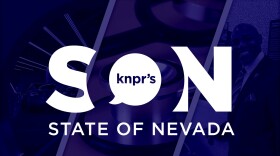The upcoming holidays mean people spend —on food, on gifts, clothes and so much more.
With inflation higher than it’s been in 40 years, people are still buying—but they’re feeling the bite. What will that mean for Nevada’s economy?
Someone whose been monitoring our local economy and inflation is Stephen Miller. He’s the director of research at UNLV’s Center for Business and Economic Research and joined State of Nevada host Joe Schoenmann along with Claytee White, the director of the university's Oral History Research Center.
Miller said he expects consumer spending to continue, but the price of goods has gone up. Turkey, for example, is up 17% compared to 2021.
Meanwhile, interest rates have also gone up, and that affects households and small businesses across the country.
“If you buy a new car, then the interest expense on your loan has gone up, so it's more costly for you to buy a car on credit. If you buy a new house, mortgage rates have gone up dramatically in the last several months. And we're seeing that affect the housing market here. Locally, the number of sales are plummeting,” he said.
But, he said inflation is coming down, and we’re going to see interest rates continue to rise. “The Fed has embarked upon a really aggressive policy; they don't want to make the mistakes that they've made in the 1970s,” he said.
Are we heading into a recession?
“That’s the $64 question,” Miller said. “I tend to be a little more optimistic and think that probably what's going to happen, we're going to have a soft landing. And I don't see a recession in the near term. Certainly, we're not going to have one in the next three to six months. I don't think maybe at the end of 2023 … we might have a what we call a growth recession.”
White, who grew up in poverty, spoke about the impacts of inflation within low-income communities.
“There is an art to survival, because you learn to do without a lot of things that the middle class, or more well to do people, might find as necessities and they are really not necessities. My mother was a great cook, my mother could make anything taste good and she did it with grace and ease just because she knew how to do that,” she said. “So, there are other kinds of systems like that that work in poor communities. People just take what they have. They share with other people. There is caring and there is love there.”
She said unemployment doesn’t cover everyone – “we’ve been out so long that people don’t count us anymore” – and that systematic racism plays a role in the cycle of poverty.
“It is widespread. It's among Blacks and Native Americans and Latinx communities and poor communities. It just happens, and it lasts for a long time. During the pandemic, we showcased essential workers, we finally looked at those people on the front lines, we looked at how valuable they are to us. And we now have raised the minimum wage. But still, there are people that that is not enough. But still, that’s what we have,” White said.
There are resources and safety nets available in these communities, though sometimes, that's not enough. “But hope can get you by sometimes."
Stephen Miller, director of research, Center for Business and Economic Research, UNLV; Claytee White, director, Oral History Research Center, UNLV








